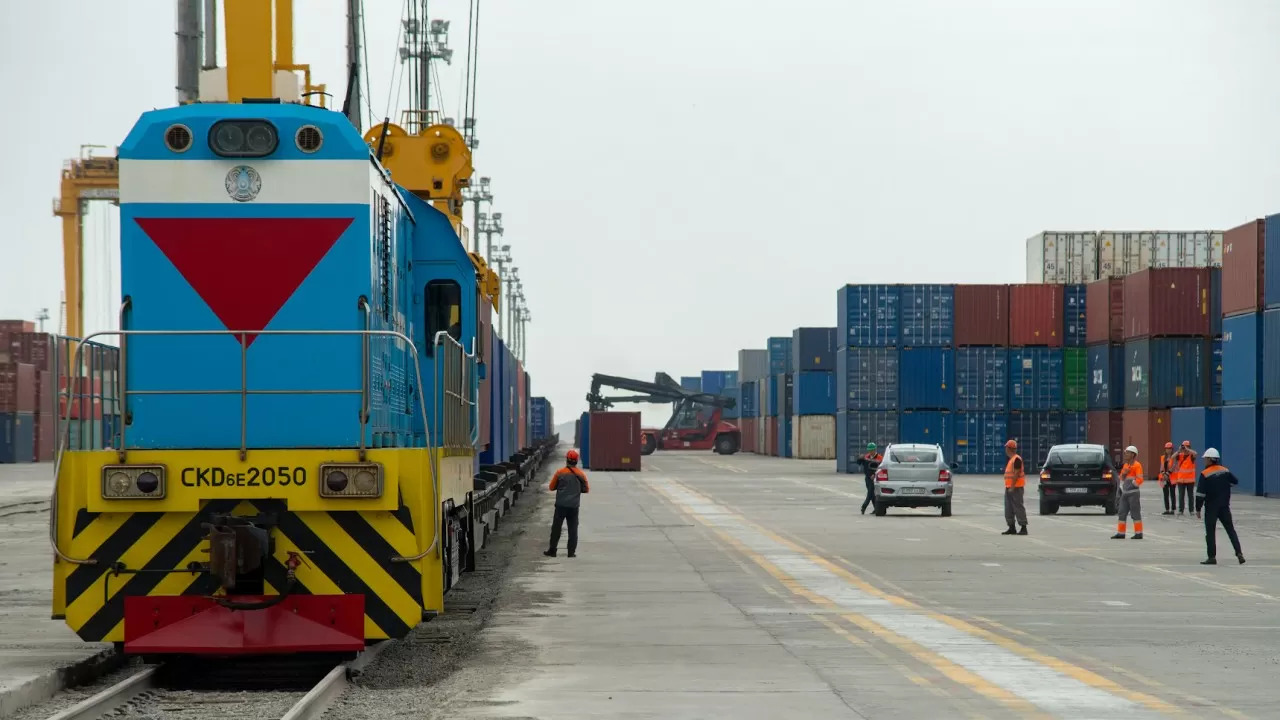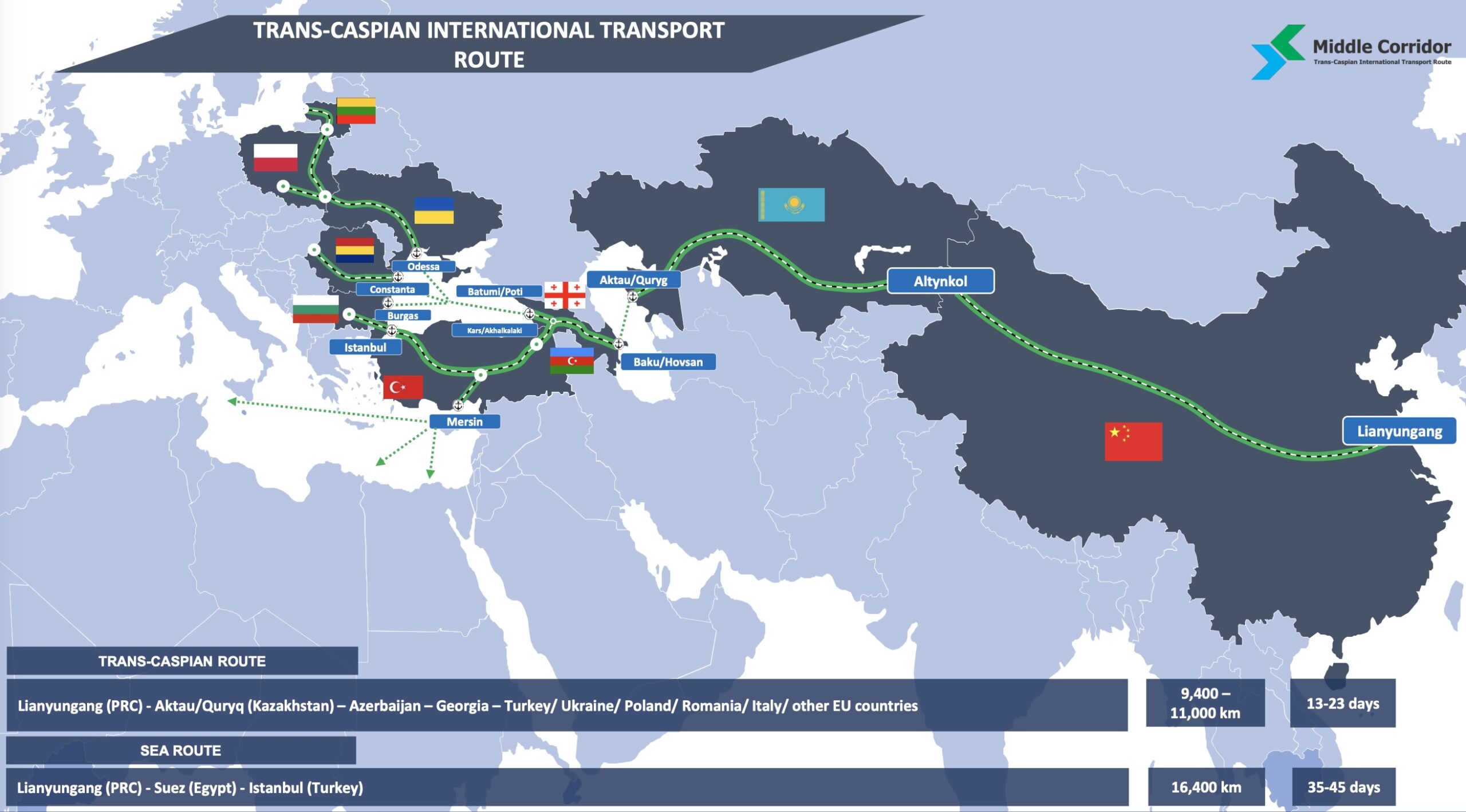ASTANA — Kazakhstan, Azerbaijan, Georgia, and Türkiye are committed to developing the Trans-Caspian International Transport Route (TITR) to improve joint transport capabilities. Also known as the Middle Corridor, the transportation route is poised to redefine Eurasian trade, offering greater efficiency and geopolitical balance.

Photo credit: inbusiness.kz
The Middle Corridor connects Southeast Asia and China with Europe. It traverses Kazakhstan, the Caspian Sea, Azerbaijan, Georgia, and Türkiye before reaching the European Union countries. In 2023, cargo transportation along the TITR exceeded 2.76 million tons, growing by 86% compared to 2022. According to Satzhan Ablaliyev, Vice Minister of Transport of Kazakhstan, this figure is expected to reach 4.2 million tons in 2024.
Middle Corridor’s development pace and investments surged over the past few years
Although the Middle Corridor has developed steadily over the past decade, progress has accelerated in the last two to three years. The rapid growth can be attributed to geopolitical changes, including shifts in traditional trade routes between the two largest economies—China and the European Union—partly caused by navigation issues through the Suez Canal.
According to the United Nations, the number of container ships transiting the Suez Canal has dropped by 67% year-over-year in 2023. Meanwhile, trade volumes along the route decreased by 43% in the first two months of 2024 compared to the same period last year.
According to the General Administration of Customs of China, the logistics turmoil led to Chinese exports decreasing by 4.6% to $3.4 trillion and imports falling by 5.5% to $2.6 trillion in 2023.

Middle Corridor. Photo credit: TITR
China’s trade with the EU has also declined by 7.1%, with exports dropping by 10.2% and imports by 0.9%. The UN Conference on Trade and Development further indicates that maritime shipping costs from Shanghai to European countries approximately tripled over the last year.
To support the development of alternative efficient trade routes between Europe and Asia, the EU announced a 10 billion euros ($10.8 billion) investment to bolster the Middle Corridor in early 2024. The EU will possibly add 18.5 billion euros (US$20 billion) in the second investment stage to ensure that roads, railways, and the seaports of Aktau and Kuryk can provide smart, safe, and fast transportation services from China to Europe.
Middle Corridor Multimodal to welcome Türkiye
In 2023, the three backbone countries of the TITR – Kazakhstan, Azerbaijan, and Georgia – agreed to establish the Middle Corridor Multimodal, a single transportation operator for the TITR. At the end of 2023, the company was registered with the Astana Financial Services Authority, and it can officially start operations by the end of 2024.
The TITR headquarters, operating since 2016, is based in Kazakhstan.
Vice Minister Ablaliyev announced that the Middle Corridor Multimodal will welcome Türkiye into its ranks by the end of 2024 or the beginning of 2025.
“Türkiye’s participation in the operation of the Middle Corridor Multimodal company is logical, as the expansion of the capacity of the Baku-Tbilisi-Kars (BTK) railway route will be completed in April. This fact is important for the Middle Corridor, as it concerns the increase in freight transportation to/from Türkiye and the transit of European and Chinese goods through Türkiye,” said Ablaliyev.
The role of Kazakhstan
China, the TITR’s largest participant and main cargo generator, considers neighboring Kazakhstan a critical link. Kazakhstan will handle most Chinese cargo reception. The nation’s railway company, Kazakhstan Temir Zholy (KTZ), has partnered with China’s Jiangsu International Rail Freight Express to operate and dispatch container trains across Kazakhstan.
In January 2024, China’s Yuxinou and KTZ launched a joint TITR service from Nanjing to Azerbaijan’s Absheron, averaging an 18-day delivery, reports the KTZ press service. Starting in February, KTZ has organized three weekly container train services from China’s Xian to Azerbaijan’s Absheron station and Georgia’s Poti/Tbilisi, leveraging a swift 12-15 day delivery window.
This year, KTZ made deals with logistics hubs in Xian, Jiangsu, Beijing, Zhengzhou, and Chongqing to organize and dispatch 3,500 transit container trains – nearly 350,000 containers – through Kazakh territory.
According to Kazinform, in March 2024, Ablaliyev announced an agreement with China to transport 10 container trains carrying 20-foot containers monthly along the Middle Corridor. This transportation volume exceeds the current maximum capacity for the Caspian ports of Aktau, Kazakhstan, and Baku.
Meanwhile, as of August 2023, Kazakh company PTC Holding is participating in the construction of Poti Transerminal – a multimodal terminal in the Georgian port of Poti, reports Kazinform. The port will play an important role in TITR and will start operating in 2024. Upon opening, the port plans to handle over 80,000 twenty-foot containers a year.
The story was originally published in Kazinform with additions from The Astana Times author.
